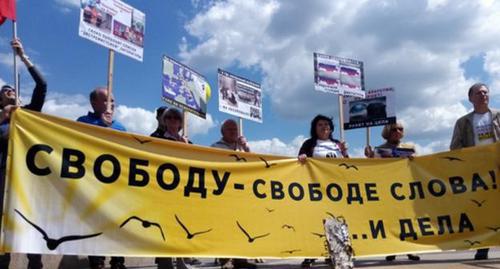
03 June 2020, 17:43
Northern Caucasus is supplier of political prisoners
Russia witnesses a growth of the number of political prisoners, including from the regions of Northern Caucasus, the Human Rights Centre (HRC) "Memorial" has noted in its report. Among those recognized as political prisoners are the Chechen human rights defender, Oyub Titiev, the journalist of the "Caucasian Knot", Zhalaudi Geriev, and the Dagestani journalist, Abdulmumin Gadjiev.
According to rights defenders, the number of political prisoners in Russia is growing: at the beginning of 2018, there were 130 of them, now there are 314 of them on the list. The vast majority of them have been deprived of their liberty because they had exercised their right to the freedom of religion.
After the 2019 rallies in Magas, well-known oppositionists, such as Akhmed Barakhoev, were criminally prosecuted. Eight leaders of the Ingush opposition, recognized as political prisoners by the HRC "Memorial", have been accused of creating an extremist community.
Among the cases against human rights defenders, the most notorious was the imprisonment of Oyub Titiev, the head of the Grozny office of the HRC "Memorial", which is accompanied by a massive solidarity campaign with him.
After his illegal detention in April 2016, the journalist, Zhalaudi Geriev, was, according to the HRC's report, a victim of planting narcotic drugs.
Among the prosecuted religious groups, apart from Muslims, are Jehovah's Witnesses declared extremists and banned in Russia, the number of which on the lists of political prisoners has grown from 1 to 66.
Now, two representatives of the Islamic Salafism, recognized as political prisoners, are in jail – Magomednabi Magomedov, an Imam from Khasavyurt, and Abdulmumin Gadjiev, a journalist of the "Chernovik" (Draft) weekly.
This article was originally published on the Russian page of 24/7 Internet agency ‘Caucasian Knot’ on June 3, 2020 at 05:35 am MSK. To access the full text of the article, click here.




